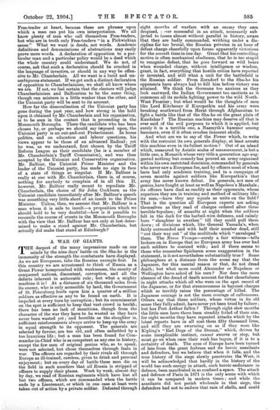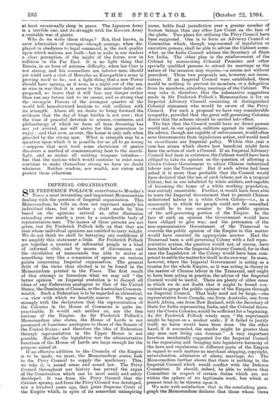T HE deepest of the many impressions made on our minds
by the nine days' battle on the Sha-ho is the immensity of the strength the combatants have displayed. As we are Europeans, take the Russian example first. In this country we are accustomed to think of Russia as a Great Power honeycombed with weaknesses, the enmity of conquered nations, discontent, corruption, and all the defects inherent in autocratic rule ; but what a mighty machine it is ! At a distance of six thousand miles from its enemy, who is only accessible by land, the Government of St. Petersburg hurls upon him a quarter of a million soldiers as effective as any to be found on earth. It is impeded at every turn by corruption ; but its commissariat on the spot is sufficient to keep that vast crowd in health; there has been no lack of munitions, though from the character of the war they have to be wasted as they have never been wasted yet ; and horrible as the slaughter is, sufficient reinforcements always arrive to keep up the army in equal strength to its opponent. The generals are selected by favour, are too old, and often enfeebled by a too luxurious life ; but a man has been found for Com- mander-in-Chief who is as competent as any one in history, except the few men of original genius who, so to speak, were not selected, but chose themselves through feats in war. The officers are regarded by their rivals all through Europe as ill-trained, careless, given to drink and personal enjoyment; but on every day of battle these men die on the field in such numbers that all Russia is stripped of officers to supply their places. Week by week, almost day by day, we read of Russian regiments which have lost all but two officers, which are commanded when the battle ends by a Lieutenant, or which in one case at least were taken out of action by a private soldier. Defeated through eight months of warfare with an enemy they ono despised, 7 2ver successful in an attack, necessarily sub. jetted to losses almost without parallel in history, aware that they are badly commanded, writhing under a dis- cipline far too brutal, the Russian privates in an hour of defeat charge cheerfully upon forces apparently victorious for the seventh time in one day. Grant that his controlling motive is often mechanical obedience, that he is too stupid to recognise defeat, that he goes forward as wild boars when wounded charge, without intelligence or wisdom, grant, in fact, everything that hostile critics have reported or invented, and still what- a unit for the battlefield is the Russian soldier. From Zorndorf to the Sha-ho his opponents have always had to kill him before victory was attained. We think the Germans too anxious as they look eastward, the Indian Government too cautious as it summons all its mobile fighting power to the wild North- West Frontier; but what would be the thoughts of men like Lord Kitchener if Kuropatkin and his army were breaking southward from Herat through Afghanistan to fight a battle like that of the Sha-ho on the great plain of Kandahar ? The Russian machine may deserve all that is ever said of the evil purposes to which it is applied, but surely it is a terrible one, a Nasmyth's hammer among hammers, even if it often crushes innocent skulls.
And what are we to say of the Power which, to write with the restraint its own generals display, at least arrests this machine even in its fullest motion ? Out of an island which, measured by Asiatic scales of measurement, is but a little one, a Monarch whose very title a generation ago sug- gested nothing but comedy has poured an army organised within his own restricted dominion, commanded by generals who never saw a European foe, and by officers most of whom have had only academic training, and in a campaign of seven months against soldiers like Kuropatkin's that army has never known defeat. Its generals, not men of genius, have fought at least as well as Napoleon's Marshals ; its officers have died as readily as their opponents, whose superiors they are in training and method of military life ; its men,—have they any equals as units on the field ? That is the question all European experts are asking themselves as they read of charges ordered after three terrible repulses; of assaults at night when the soldiers felt in the dark for the barbed-wire defences, and calmly bore " slaughter in swathes " till they could pull them down; of divisions which, like General Yamada's, when fairly surrounded and with half their number dead, still " cut their way out " of the multitude which " enveloped " them. The Novoe Vremya—surely a fair witness—tells lookers-on in Europe that no European army has ever had such soldiers to contend with; and if there seems to those who remember Spicheren some exaggeration in the statement, is it not nevertheless substantially true ? Some philosophers at a distance from the scene say that the Japanese, for this mental reason or that, do not dread death ; but what more could Alexander or Napoleon or Wellington have asked of his men ? Nor does the mere absence of the dread of death account for that cheerfulness in night attacks which all who were on the spot record of the Japanese, or for that strenuousness in bayonet charges which so terribly raises the percentage of killed. The Japanese courage is not the mere courage of callousness. Others say that these soldiers, whose virtue in its old sense they fully admit, have never yet been tried by failure ; but has Port Arthur fallen ? Through eight slow months the little men have there been steadily foiled of their aim, for eight months they have repeated attacks which by the latest reports have in all cost them fifty thousand lives, and still they are swarming on as if they were like Kipling's"Red Dogs of the Deccan," which, driven by some inexplicable instinct, cannot swerve or stop, but must go on when once their rush has begun, if it is to a certainty of death. The eyes of Europe have been turned of late from the great fortress and its heroic assailants and defenders, but we believe that when it falls, and the true history of the siege slowly penetrates the West, it will be acknowledged that hardly in the history of the world has such energy in attack, such heroic endurance in defence, been manifested in so confined a space. The attack and defence of Paris in 1871 is the only scene with which it can be compared in modern times ; and while the assailants did not perish wholesale in that siege, the defenders had not to endure that rain of shells, and could at least occasionally sleep in peace. The Japanese Army is a terrible one, and its struggle with the Russian Army a veritable war of giants.
Why do we write these things ? Not, God knows, in mere admiration of courage—though courage, when dis- played in obedience to legal command, is the rock quality upon which nations are built—but to wake in our readers a clear perception of the might of the forces now in collision in the Far East. It is no light thing that Russia, in an hour of extreme difficulty, when her Czar is not strong, and his counsellors are inferior men, should yet wield such a club of Hercules as Kuropatkin's army is proving itself to be; not a light thing that a new Power should have sprung, as it were, in a night out of the sea, so wise in war that it is never to the minutest detail un- prepared, so brave that it will face any danger rather than run any future risk to its career, and so strong that the strongest Powers of the strongest quarter of the world will henceforward hesitate to risk collision with its strength. Above all, we desire to bring forward the evidence that the day of huge battles is not over ; that the time of peaceful devotion to science, commerce, and philanthropy of which we have all been dreaming has not yet arrived, nor will arrive for this generation to enjoy ; and that now, as ever, the house is only safe when guarded by the strong man. What is strength may be a question upon which it is possible for us all to go wrong —suppose that next week some electrician of genius discovers a method of communicating heat to the search- light, and so makes all existing weapons valueless— but that the nations which would continue to exist must continue to make themselves strong we have no doubt whatever. Neither wisdom, nor wealth, nor virtue will protect them otherwise.











































 Previous page
Previous page